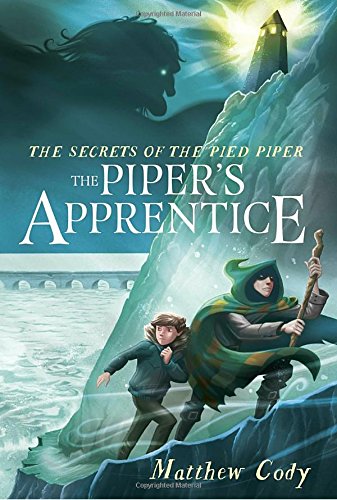
![]() The Piper’s Apprentice by Matthew Cody
The Piper’s Apprentice by Matthew Cody
The Piper’s Apprentice concludes Matthew Cody’s THE SECRETS OF THE PIED PIPER series, which began with The Peddler’s Road, followed by The Magician’s Key. I haven’t read book one, but I found the second book to be an enjoyable enough story aimed squarely, and successfully I’d imagine, at its middle grade audience. Book three has its issues, but is mostly a solid and satisfying conclusion. Warning: there will be spoilers for the first two books, which I’ll assume one has read (and thus I won’t bother explaining characters or prior plots).
In The Magician’s Key, the two siblings Max and Carter had separate adventures thanks to Max being stuck in mundane Earth while Carter was on the Summer Isle. Max is back in the Isle here in The Piper’s Apprentice, but the two remain separated for the vast majority of the story. Carter is journeying with the Piper, who is trying to teach Carter magic in hope that Carter will retrieve the Piper’s magic pipe, the same one he used to steal the children of Hamelin centuries earlier. The Piper remains an enigma in terms of just how much of a villain he will turn out to be, with Carter pretty much the only one who really holds out hope for him. Their journey is filled with conflict between the two of them, and the trip becomes more problematic when they are pursued by Granny Yaga and rats (it also doesn’t help that Carter’s magic is erratic at best).
Meanwhile, Max is searching for Carter, aided by some of the lost children of Hamelin. As in book two, Max’s story is a bit more dark, beginning with a journey through a town where the shades of the newly dead await passage on boats that are not coming (leaving the shades a bit surly), while Carter’s is better with character development. The reason for the boats’ absence, and for a slew of other not-so-great changes coming to the Summer Isle, is the death of the Peddler back in book one and the loss of his magicked road, which had kept Granny Yaga and other evils at bay. Max, like Carter, has her run-ins with the old witch, and also has to find some way past an army of ogres and rats who are massing to attack New Hamelin.
Young readers who might have difficulty recalling past events will be happy at the lengthy exposition Cody so conveniently provides, though older readers might find it all a bit clumsily done. Similarly, MG readers will I’d say find The Piper’s Apprentice’s fast pace exhilarating as the characters move from one obstacle to another. Older readers, however, will almost certainly think the heroes overcome said obstacles too easily and too quickly, with little true sense of suspense or danger and little story development, and will probably find the close predictable. A few plot events, especially toward the end, are pretty implausible, and I’m not sure even the target audience will just accept them, though they’re likely to be less bothered by them (the same holds true, I’d imagine, with the utter idiocy of the ogres, which makes them not much of a threat)
The trilogy isn’t particularly sophisticated, deep, rich, or original — Granny Yaga is obviously borrowed from the old folktales, there’s a magic sword, a road that keeps evil away, familiar beasties (ogres, giant rats, kobolds), ships to ferry away the dead, and more. But Cody’s prose is mostly smooth and fluid, the story never bogs down, and there are several nice emotional moments. I’d certainly send MG readers to other books first (such as Lloyd Alexander’s classic Prydain series or Suzanne Collins’ Gregor the Overlander series), but once they’ve exhausted those (and young readers can sometimes whip through series) and they need to drop down into a second tier of quality to keep reading, Cody’s trilogy is entertaining and engaging enough.



“Granny Yaga” probably is a pretty close translation of the original.
I was thinking while I was reading the review that if I were newly dead and waiting for the ship to take me to the next place and they were late, I’d get cranky too. I get anxious if I can’t see the ferry pulling into the strait ten minutes before we’re supposed to leave; I’d definitely qualify as “unquiet dead.”